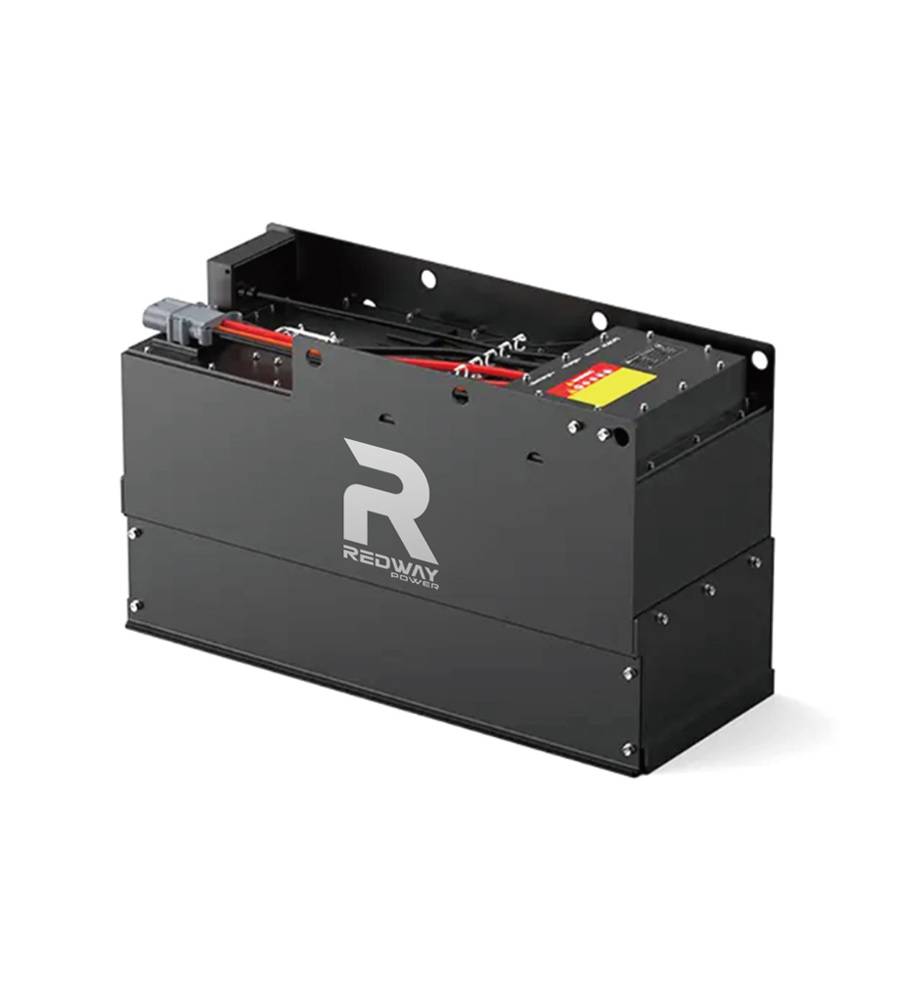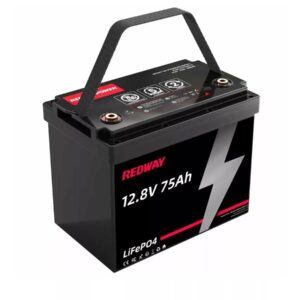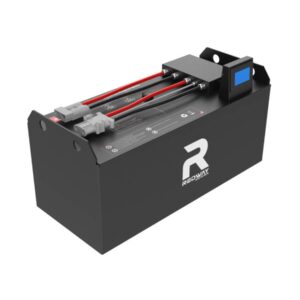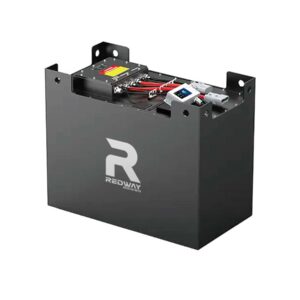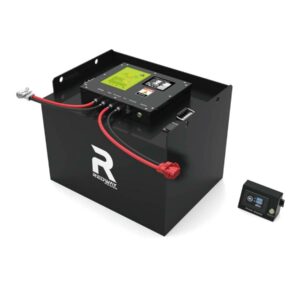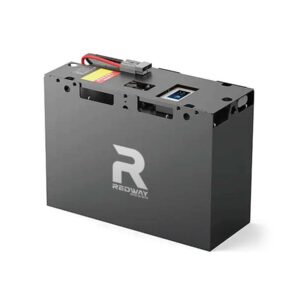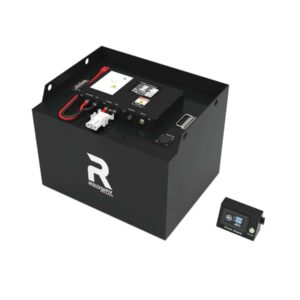Description
Our 48V 200Ah LiFePO4 Forklift Battery is a cutting-edge industrial energy solution engineered for demanding material handling tasks. As a leading lithium battery manufacturer, we specialize in OEM-ready designs that deliver unmatched durability, efficiency, and cost savings for warehouse operations and logistics fleets.
Key Features
Extended Runtime: 200Ah capacity provides 9.6 kWh energy output, equivalent to 240Ah lead-acid batteries with 30% weight reduction for enhanced forklift maneuverability.
Cycle Dominance: 3,000+ full-depth discharge cycles ensure 5-8 years of service life, outperforming traditional batteries by 400% in longevity.
High-Power Delivery: Sustains 600A continuous/800A peak current for heavy lifting operations without voltage drops.
Military-Grade Protection: IP65-rated metal housing resists dust, water jets, and mechanical impacts in harsh warehouse environments.
Intelligent Monitoring: Multi-layer BMS prevents overcharge, overheating, and cell imbalance while enabling real-time SOC tracking via CAN communication.
Product Description
Designed for OEM integration, our 48V 200Ah LiFePO4 Forklift Battery combines modular architecture with rapid-charging capabilities, achieving 0-80% charge in 2 hours at 1C rate. The compact 522¡Á315¡Á618mm footprint allows seamless retrofitting into Class I-III forklifts, while the vibration-resistant structure ensures stable performance across -20¡ãC to 60¡ãC temperature ranges.
Customizable voltage configurations (48V) and terminal types cater to global forklift models, supported by flexible OEM/ODM services. Our lithium battery solutions reduce total ownership costs through zero maintenance requirements and 25-day expedited global shipping (FOB/EXW/CIF terms).
What are the performance benefits of a 48V 200Ah lithium forklift battery?
A 48V 200Ah lithium forklift battery enables 24/7 shift operations with 2-hour rapid charging, eliminating lead-acid¡¯s 8-hour cooling requirements. Its 95% energy efficiency reduces electricity costs by 40% compared to lead-acid alternatives.
What are the long-lasting maintenance tips for a 48V lithium forklift battery?
Store the 48V lithium forklift battery at 30-50% charge in 15-25¡ãC environments when idle. Perform monthly BMS health checks via Bluetooth-enabled diagnostic tools provided with OEM orders.
What is the cost-effective lifespan analysis of a 200Ah lithium forklift battery?
The 200Ah lithium forklift battery achieves 10-year ROI through 3,000+ cycles versus 800 cycles of lead-acid models, saving $12,000+ in replacement and energy costs per unit.
What are the fast-charging specifications for a 48V 200Ah lithium battery?
Supports 100A continuous charging (0.5C) with optional 200A (1C) boost mode, compatible with 44-58V charging systems. Thermal sensors maintain optimal 25-40¡ãC cell temperature during charging.
What safety features are included in 48V 200Ah lithium-ion forklift batteries?
UL1973-certified cells with flame-retardant separators, plus multi-stage BMS protections against reverse polarity, cell rupture, and ground faults.
How does a 48V lithium forklift battery compare to a lead-acid battery in terms of efficiency?
The 48V lithium forklift battery maintains 100% capacity throughout discharge versus lead-acid¡¯s 50% usable capacity, enabling 30% longer per-shift operation.
Pricing and Supply Chain for Lithium Forklift Batteries
What is the average price of 48V 200Ah lithium forklift batteries in China?
The average price of a 48V 200Ah lithium forklift battery in China typically ranges from $3,000 to $6,000, depending on the manufacturer and specific features. Pricing can also vary based on battery management systems, warranty, and brand reputation. Bulk purchases and long-term contracts may offer discounts, making the price more competitive for large-scale operations.
Top manufacturers of 48V 200Ah lithium forklift batteries in China?
Leading manufacturers of 48V 200Ah lithium forklift batteries in China include BYD, CATL, and Gotion High-Tech. These companies are recognized for their high-quality, durable, and cost-effective lithium batteries, widely used in industrial forklifts. They are industry leaders in technology and after-sales support.
How does warranty period affect lithium forklift battery pricing?
A longer warranty period can increase the upfront cost of lithium forklift batteries. Batteries with warranties of 5 to 10 years typically cost more, but the extended coverage offers long-term reliability and peace of mind. Longer warranties usually indicate higher confidence in battery durability, providing greater value over time.
Are Chinese lithium forklift battery supply chains reliable?
Chinese lithium forklift battery supply chains are generally reliable, supported by efficient manufacturing processes and well-established companies like BYD and CATL. These suppliers can meet both domestic and global demand due to their robust production capabilities and logistics networks. Ensuring a partnership with reputable suppliers helps minimize potential disruptions.
Cost differences: China vs other countries for lithium batteries?
Lithium forklift batteries are often more affordable when sourced from China due to lower production costs and access to abundant raw materials. However, factors like shipping fees, tariffs, and local taxes may impact the final price. Batteries from other regions, such as Europe or North America, are typically more expensive because of higher labor and production costs.
Current market trends impacting lithium forklift battery prices?
Key trends influencing lithium forklift battery prices include rising demand for electric forklifts, fluctuations in raw material prices like lithium, and advancements in battery technology. As global demand for electric vehicles grows, the lithium battery market becomes more competitive, affecting both price and supply.
Lithium Forklift Batteries: Certifications, Safety, and Efficiency
What are key certifications for lithium battery suppliers?
Key certifications for lithium battery suppliers include ISO 9001 for quality management, UL 2054 for safety, and CE for compliance with European safety standards. These certifications ensure the batteries meet international performance and safety requirements, providing consumers with confidence in their quality and reliability.
How do lithium batteries improve forklift efficiency?
Lithium batteries improve forklift efficiency by offering faster charging, longer operational times, and consistent power delivery. Their high energy density reduces downtime and increases productivity, while their minimal maintenance requirements keep forklifts running efficiently for longer periods, reducing overall operational costs.
What safety features do lithium forklift batteries have?
Lithium forklift batteries are equipped with advanced safety features such as Battery Management Systems (BMS) to monitor charge levels, thermal protection to prevent overheating, and overcharge protection. These features ensure safe operation by minimizing the risks of fires, explosions, or other hazards that could arise during use.
Which industries use high-capacity lithium forklift batteries?
Industries such as warehousing, logistics, automotive manufacturing, and distribution centers often rely on high-capacity lithium forklift batteries. These industries require forklifts that can operate continuously with minimal downtime. Lithium batteries’ high energy density allows forklifts to handle heavy loads while maintaining consistent performance throughout shifts.
How to maintain high-capacity lithium batteries for forklifts?
To maintain high-capacity lithium batteries for forklifts, ensure they are regularly charged before depletion, avoid overcharging, and store them in cool, dry environments. Periodically clean the terminals and inspect for damage. Following the manufacturer’s guidelines for battery maintenance helps extend its lifespan and maintain peak performance.
What trends drive lithium battery adoption in forklifts?
Trends driving lithium battery adoption in forklifts include environmental sustainability, lower operational costs, and the demand for faster charging in high-demand industries. As technology improves and prices decrease, lithium batteries are becoming more common in forklifts due to their longer lifespan and higher efficiency compared to traditional lead-acid batteries.
Lithium Forklift Batteries in Warehousing
What are lithium battery applications in warehousing?
Lithium batteries are used in warehousing for powering forklifts, pallet trucks, and automated guided vehicles (AGVs). Their high energy density enables long operational periods, reducing downtime. Additionally, their fast charging cycles keep operations running smoothly. Lithium batteries also help warehouses meet sustainability goals by reducing energy consumption.
How do lithium batteries improve warehouse efficiency?
Lithium batteries improve warehouse efficiency by offering faster charging, longer operation times, and reduced maintenance compared to traditional lead-acid batteries. With less downtime, forklifts and AGVs can operate continuously, leading to higher productivity and reduced operational costs in busy warehouse environments.
What safety measures are needed for warehouse lithium batteries?
Safety measures for lithium batteries in warehouses include ensuring proper ventilation during charging, using temperature monitoring systems to avoid overheating, and employing Battery Management Systems (BMS) to protect against overcharging. Regular inspections for signs of damage or wear are essential to ensure safe operation.
How do lithium batteries support automated warehouse systems?
Lithium batteries support automated warehouse systems by providing consistent, long-lasting power to robotic forklifts and AGVs. Their lightweight nature and fast charging capabilities allow these systems to run efficiently, minimizing downtime and maximizing operational productivity. This supports seamless and continuous operations in high-demand warehouse settings.
What are challenges in deploying lithium batteries in warehousing?
Challenges in deploying lithium batteries in warehousing include the higher initial cost compared to lead-acid batteries and the need for specialized charging infrastructure. Additionally, businesses must invest in battery management systems and ensure proper maintenance. However, these challenges are often outweighed by long-term cost savings and operational benefits.
How do lithium batteries impact warehouse sustainability goals?
Lithium batteries contribute to warehouse sustainability by reducing energy consumption, offering longer lifespans, and decreasing maintenance requirements. Their higher efficiency and recyclability also reduce the environmental footprint. This helps warehouses minimize waste and reduce reliance on traditional energy sources, supporting broader environmental goals.
Safety and Standards for 48V Lithium Forklift Batteries
What are 48V lithium forklift battery safety standards?
48V lithium forklift batteries must meet safety standards such as UL 2054, UN38.3, and CE certifications. These ensure that the batteries are safe to use in industrial environments, capable of handling high-power demands, and suitable for transport. Meeting these standards helps prevent risks such as overheating or thermal runaway.
Key safety requirements for 48V lithium forklift batteries?
Key safety requirements for 48V lithium forklift batteries include the presence of a Battery Management System (BMS) to monitor charge levels, overcharge protection, thermal protection, and the ability to withstand shock and vibration. Proper installation and regular maintenance are crucial to ensure these systems function correctly and maintain battery safety.
How to certify 48V lithium batteries for forklifts?
To certify 48V lithium forklift batteries, manufacturers must pass rigorous tests for safety and performance, such as those outlined in UL 2054, IEC 62133, and UN38.3. These tests ensure the battery meets electrical safety, thermal performance, and transportation safety standards. Certification ensures the battery can be safely used in forklifts.
How temperature affects 48V lithium battery safety?
Temperature affects 48V lithium battery safety by influencing battery performance and risk factors. High temperatures can cause overheating, leading to potential failure or thermal runaway. Cold temperatures reduce battery performance. Lithium batteries should be used and stored within the manufacturer’s recommended temperature range to maintain safety and efficiency.
Lithium vs lead-acid forklift battery maintenance differences?
Lithium forklift batteries require less maintenance compared to lead-acid batteries. They do not need regular watering, and their built-in Battery Management Systems (BMS) prevent overcharging and deep discharge. In contrast, lead-acid batteries require periodic water refilling, frequent cleaning, and proper ventilation to prevent gas buildup during charging.
Future trends in 48V lithium forklift battery safety?
Future trends in 48V lithium forklift battery safety include advancements in thermal management, more sophisticated Battery Management Systems (BMS), and the development of solid-state batteries for enhanced safety. These innovations aim to reduce the risk of thermal runaway, improve charging efficiency, and increase overall battery reliability.

